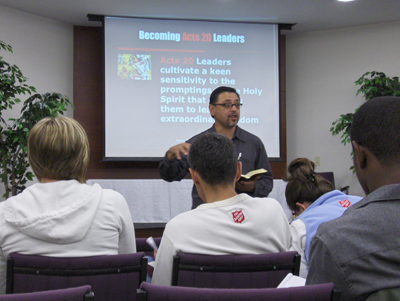 The Christian Community Development Association (www.ccda.org) is an American-based, association of over 3,000 individuals and more than 500 organizations from grassroots, community-based groups to some of the largest relief and development organizations in the world.
The Christian Community Development Association (www.ccda.org) is an American-based, association of over 3,000 individuals and more than 500 organizations from grassroots, community-based groups to some of the largest relief and development organizations in the world.
The mission of the CCDA is to inspire and train Christians who seek to bear witness to the Kingdom of God by reclaiming and restoring under-resourced communities. The vision is for holistically restored communities with Christians fully engaged in the process of transformation. Christian Community Development consists of eight key components:
1. Church-Based
2. Presence in the Community (Relocation)
3. Reconciliation
4. Listening to the Community
5. Holistic Approach
6. Empowerment
7. Leadership Development
8. Redistribution
On May 2-3, the CCDA made their first foray into Canada at “The New Suburbia” conference in Toronto. “The New Suburbia” was organized and hosted by The Salvation Army Corps Ministries Department (THQ) as an integrated mission forum. The 150 delegates to the institute came together from a variety of agencies and churches, representing a diverse denominational spectrum.
The guests from the CCDA were Noel Castellanos, CEO of the CCDA, Wayne “Coach” Gordon, co-founder of the CCDA and presently with the Lawndale Community Church in Chicago and Robert Lupton, FCS Ministries Urban Ministries in Atlanta. The workshop titles were: Church-based Community Development (Gordon); Indigenous Leadership Development (Castellanos); Harnessing the Forces of Gentrification for the Kingdom (Lupton).
On Friday evening at “The New Suburbia”, a panel discussion was held entitled “The Future of the City”. The panel members were Noel Castellanos and Wayne Gordon from the CCDA; Rick Tobias, CEO of the Yonge Street Mission and lecturer at Tyndale on urban ministry and poverty issues; Rob Joustra, lead researcher for the Hamilton-based Work Research Foundation, a Christian public policy think-tank; Heikki Walden, a Toronto real estate agent active in the New Urbanism movement. The moderator of the evening was Major Floyd Tidd of the THQ Corps Ministries Department. The evening was a lively two-hour interaction between panelists and delegates on topics such as the role of race and class in issues of poverty, the “suburbanization” of the downtown cores, and the further shape of ministry in responding to these powerful forces.
The New Suburbia SpeakerThe focus of the two-day event was an effort to broaden and extend the conversation regarding the massive demographic and economic shifts taking place in cities throughout Canada and the US (and in many places Europe). From the 1950s to the 1970s, thousands of people moved wholesale out of the downtown areas into the newly constructed suburbs. These trends are now reversing as people flood back to the downtown cores. New housing, mostly condominium residences, are sprouting up everywhere. This is good for the cities because they desperately need the money generated through property taxes, and consequently politicians are not in a position to say no the developers.
The new urbanites are a boon to the cities because of the money they bring with them, in rents, property purchases, money spend of entertainment and on amenities. So everybody wins, everybody except the poor and disenfranchised, that is. They are being uprooted and moved out of their historical neighbourhoods in the downtown areas, to the suburban inner and outer rings, further and further away from the new developments. And further from the services that they regularly access.
There demographic and economic shifts are implications for both the outer suburban communities and the downtown/inner city communities. While urban planners and developers think strategically 25 to 40 years into the future, church communities typically vision the future no more than five years ahead, forever playing catch up. These factors and a host of other ideas and concepts discussed at “The New Suburbia” have massive implications for the mission of every church in every city. “The New Suburbia” was for many missional leaders the start of a new conversation on how to expand God's Kingdom in the cities.
That They May All Be One
A love letter from The Salvation Army to the broader church.
by General Brian Peddle (Rtd) Opinion & Critical Thought"Dear Unity: Overdue Love Letters to Heal a Divided Church" contains 30 chapters, one written by General Peddle, from a variety of denominations and traditions, expressing a desire for unity among churches.
The Bread of Life
Jesus offers transformation, not transaction.
by Major Corinne Cameron Opinion & Critical ThoughtIn the Gospel of John, Jesus provides seven names of relationship that teach us how we may be in relationship with him. Over this next year, we are going to visit each one of these “I am” statements of Jesus.
Open Hands, Open Hearts
In Costa Rica and Panama, The Salvation Army nurtures hope where it’s needed most.
BY LT-COLONEL BRENDA MURRAY AND MARK YAN FeaturesThe Salvation Army’s ministry in the Latin America North Territory—spanning 10 Spanish-speaking countries—is a vibrant expression of faith, culture and compassion. This photo essay focuses on Costa Rica and Panama, where God’s love is lived out in classrooms, corps halls, seniors’ homes, migrant shelters and a training college.









Leave a Comment